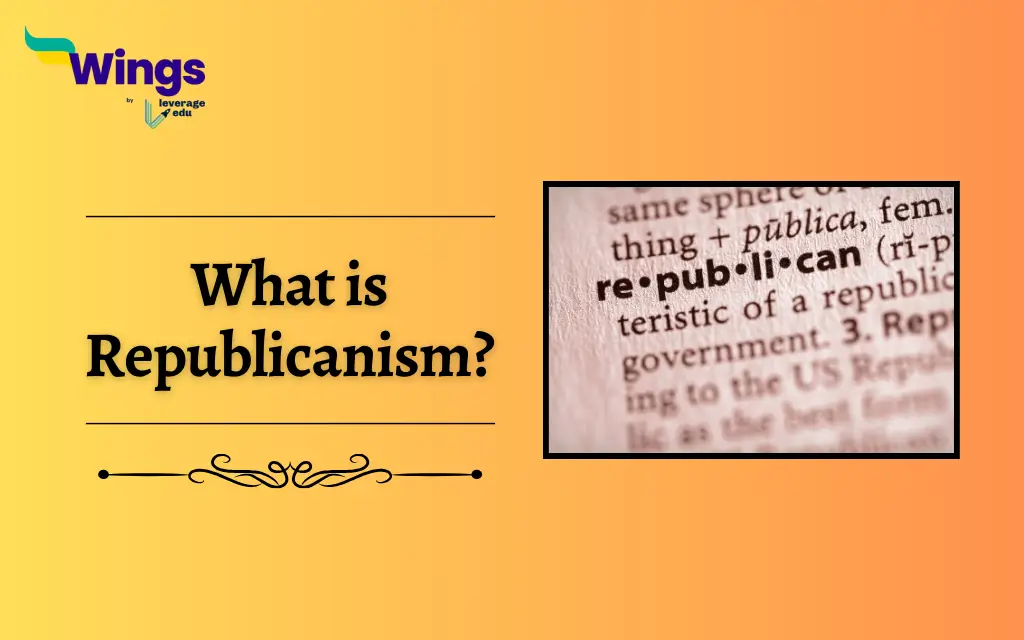Throughout history, Republicanism has an important role in shaping societies. The Republican philosophy advocates for a State in which sovereignty remains with the people rather than a monarch or ruler. Furthermore, it emphasises civic virtues, public participation, and constitutional rule. Moreover, citizens elect their leaders in a Republic, and constitutional limits limit the government’s power. Read on to learn more in detail about what is Republicanism, definition, history and significance.
Contents
Republicanism in Simple Terms
Republicans believe that the ultimate power in government should rest with the people, who exercise their authority through elected representatives. In essence, Republicanism can be likened to a three-legged stool, where each leg represents one of the 3 branches of government which are the Executive, legislative and judicial. Moreover, the equilibrium between these branches is important for maintaining a stable society. Moreover, unlike monarchies or authoritarian regimes that concentrate power within people.
Also Read: What is Representative Democracy?
What is a Republican Government?
A Republican Government operates based on principles that prioritise the interests and will of the people. Moreover, such a Government does not follow a Monarchy; instead, Heads of state are chosen through processes like elections. Furthermore, the key characteristics of this form of government include separation of powers and checks and balances as safeguarding individual rights and liberties.
Also Read: French Revolution: History, Cause, Timeline, & Events
Characteristics of Republicanism
Additionally, the Characteristics of Republicanism are as follows:
1. Popular Sovereignty: In a republic, ultimate power resides with the people. Moreover, elected representatives make decisions on behalf of citizens regarding policies.
2. Rule of Law: Republicanism emphasises equality for all citizens irrespective of their position or influence. Thus, this guarantees that governmental actions are fair and just.
3. Civic Virtue: Active political participation and prioritising the good are encouraged within ideals. Civic engagement and responsibility lie at the core.
4. Limited Government: In a Republic the power of the government is restricted to prevent any form of abuse. Therefore, to ensure that both citizens and government officials understand their rights and responsibilities a Constitution is put in place.
Also Read: 8 Features of Party System in India
Famous Leaders of Republicanism
There have been a lot of Republican leaders throughout history. Among the most notable are Thomas Jefferson and James Madison, who played key roles in founding the United States and drafting its constitution. Moreover, Maximilien Robespierre fought for Republican ideals during the French Revolution.
Republic Government Examples
There are a lot of Republican countries around the world. Among the most prominent republics are the US, France, and Italy, each with their political traditions.
Republic Government Countries
Republicanism is not just for one region or culture. Globally, it takes many forms. Republics like Germany, India, and South Africa have their histories and approaches to Republican government.
This quiz no longer existsRelated Blogs
| What is Adjournment Motion? | Meaning of Zero Hour |
| What is the Doctrine of Colourable Legislation? | What is a Writ of Prohibition? |
| What is the Difference between Fundamental Rights and Directive Principles? | What is the Difference between Fundamental Duties and Directive Principles? |
| What is Universal Adult Franchise? | What is the Difference Between Fundamental Rights and Fundamental Duties? |
Lastly, we hope you liked our blog and gained an understanding of What is Republicanism. Moreover, you may even read more blogs and empower yourself with knowledge regarding Civics and Polity!
 One app for all your study abroad needs
One app for all your study abroad needs














